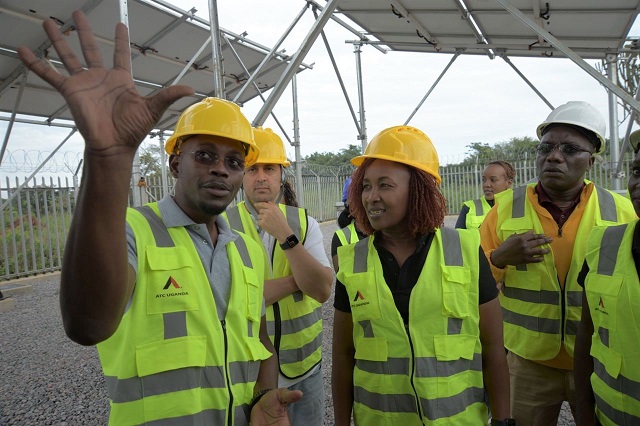
COMMENT | Sylvia Mulinge | A few weeks ago, I had the opportunity of visiting one of our hybrid network sites located in Luweero district approximately 60km out of Kampala. This site, which early next year shall be converted to a 100% low carbon emission site, currently employs 40 solar panels to serve a rural population of over 22,000 people in areas of Nakigonza and Tongo in Zirobwe sub-county.
At MTN Uganda, we are strong proponents of protecting the environment we operate in. We recognize the adverse effects of climate change on the communities we operate in and in turn the business we operate. We are therefore committed to doing our part to minimize emission of greenhouse gases arising from our operational activities. In line with this, all our infrastructure and operations now have environmental sustainability at the core aligning ourselves to the UN Sustainable Development Goals 7 (affordable and clean energy) and 13– climate action.
While the impact of climate change may seem farfetched for many Ugandans, the country is already experiencing the effects as evidenced by the prolonged droughts, landslides, floods, and changes in weather seasons. These disasters are threatening health, food and water security while curtailing social-economic development.
In September 2022, mudslides in Rukooki, Kasese District in Western Uganda led to the loss of lives of no less than15 people, destroying homes and property. And just two months earlier in July, 24 lives perished in floods in Mbale District including a group of friends and family on their way to a traditional wedding ceremony. Similar disasters have occurred in various parts of the country leading to loss of lives and livelihood. It is imperative that action be taken by all, however small, to turn the tide.
MTN has embarked on its journey to turn the tide through Project Zero, in alignment with the Paris Climate Agreement to limit global temperature rise to 1.5°C. Launched in 2021, Project Zero is leveraging the latest technologies and service partnerships to deliver greater energy efficiency, lower carbon emissions, reduce risks and improve cost controls.
We are transitioning to a low-carbon economy and adopting cleaner energy technologies that include integrating hydro electric energy, solar and lithium-ion battery storage. Where sites are running more than 7hours on diesel generators, we are actively migrating them to hydro power grid to minimize the run hours.
Where the installation space permits, sites are being converted to100% solar powered sites with 60 solar panels or more while for locations where installation space remains a challenge 87% of these run a hybrid solution of solar and hydro power grid.
We have also deployed energy saving solutions that power down the sites during off peak hours and migrated almost 100% of our sites to outdoor solutions that do not require high powered air conditioning which collectively lowers energy consumption. All these solutions are lowering our emission of greenhouse gases into the atmosphere and are bringing us closer to our 2040 goal of Net Zero carbon emission.
Furthermore, at all the MTN Uganda office premises, a number of interventions have been made: Compact Fluorescent Lamp (CFL) bulbs have been replaced with LEDs to minimize power consumption and carbon dioxide emission into the atmosphere, staff have embraced the recycle, reduce, and reuse mentality for waste management.
For instance, in October 2022, one tonne of used paper generated from our operations was recycled at Global Paper Industries located in Mbalala in Mukono District and all our kitchen waste is sorted into recyclable, biodegradable, and non-recyclable which minimizes the environmental pollution.
The company also operates in a paperless environment where all documents are signed digitally. This is intended to minimize paper usage which in turn conserves trees that are crucial in the absorption of carbon dioxide from the atmosphere hence combating climate change.
All these interventions are to enable the benefits of a modern connected life for all Ugandans sustainably. We are implementing the eco-responsibility strategy which emphasizes commitment to protecting the planet by achieving net zero emissions by 2040.
MTN Uganda’s target is to reduce Green House Emissions from 11,882 tonnes of carbon dioxide equivalent (tCOe2) which was the baseline in 2021 to 5941 tCOe2 by 2030 and to 0 tCOe2 by 2040 for scopes 1, 2, and 3 where Scope 1 covers direct emissions from owned or controlled sources, scope 2 covers indirect emissions from the generation of purchased electricity, steam, heating, and cooling consumed by the reporting company and Scope 3 includes all other indirect emissions in a company’s value chain.
As an eco-responsible company, MTN Uganda recognizes the importance of conservation of our environment and the need to urgently adopt measures that limit environmental degradation. It is for this reason that we have mainstreamed eco-responsibility as a key priority in our ESG commitments so we can create shared value in the communities we operate in.
******
 Sylvia Mulinge is the Chief Executive Officer at MTN Uganda.
Sylvia Mulinge is the Chief Executive Officer at MTN Uganda.
 The Independent Uganda: You get the Truth we Pay the Price
The Independent Uganda: You get the Truth we Pay the Price



